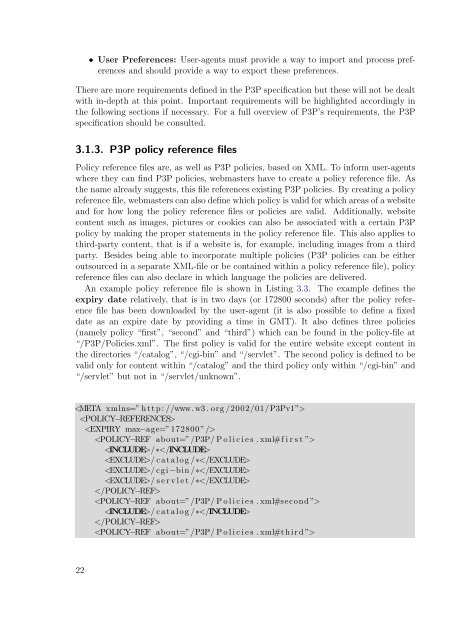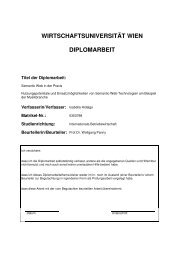Wirtschaftsuniversität Wien Magisterarbeit - SemanticLab
Wirtschaftsuniversität Wien Magisterarbeit - SemanticLab
Wirtschaftsuniversität Wien Magisterarbeit - SemanticLab
You also want an ePaper? Increase the reach of your titles
YUMPU automatically turns print PDFs into web optimized ePapers that Google loves.
• User Preferences: User-agents must provide a way to import and process preferences<br />
and should provide a way to export these preferences.<br />
There are more requirements defined in the P3P specification but these will not be dealt<br />
with in-depth at this point. Important requirements will be highlighted accordingly in<br />
the following sections if necessary. For a full overview of P3P’s requirements, the P3P<br />
specification should be consulted.<br />
3.1.3. P3P policy reference files<br />
Policy reference files are, as well as P3P policies, based on XML. To inform user-agents<br />
where they can find P3P policies, webmasters have to create a policy reference file. As<br />
the name already suggests, this file references existing P3P policies. By creating a policy<br />
reference file, webmasters can also define which policy is valid for which areas of a website<br />
and for how long the policy reference files or policies are valid. Additionally, website<br />
content such as images, pictures or cookies can also be associated with a certain P3P<br />
policy by making the proper statements in the policy reference file. This also applies to<br />
third-party content, that is if a website is, for example, including images from a third<br />
party. Besides being able to incorporate multiple policies (P3P policies can be either<br />
outsourced in a separate XML-file or be contained within a policy reference file), policy<br />
reference files can also declare in which language the policies are delivered.<br />
An example policy reference file is shown in Listing 3.3. The example defines the<br />
expiry date relatively, that is in two days (or 172800 seconds) after the policy reference<br />
file has been downloaded by the user-agent (it is also possible to define a fixed<br />
date as an expire date by providing a time in GMT). It also defines three policies<br />
(namely policy “first”, “second” and “third”) which can be found in the policy-file at<br />
“/P3P/Policies.xml”. The first policy is valid for the entire website except content in<br />
the directories “/catalog”, “/cgi-bin” and “/servlet”. The second policy is defined to be<br />
valid only for content within “/catalog” and the third policy only within “/cgi-bin” and<br />
“/servlet” but not in “/servlet/unknown”.<br />
<br />
<br />
<br />
<br />
/∗<br />
/ c a t a l o g /∗<br />
/ cgi −bin /∗<br />
/ s e r v l e t /∗<br />
<br />
<br />
/ c a t a l o g /∗<br />
<br />
<br />
22





